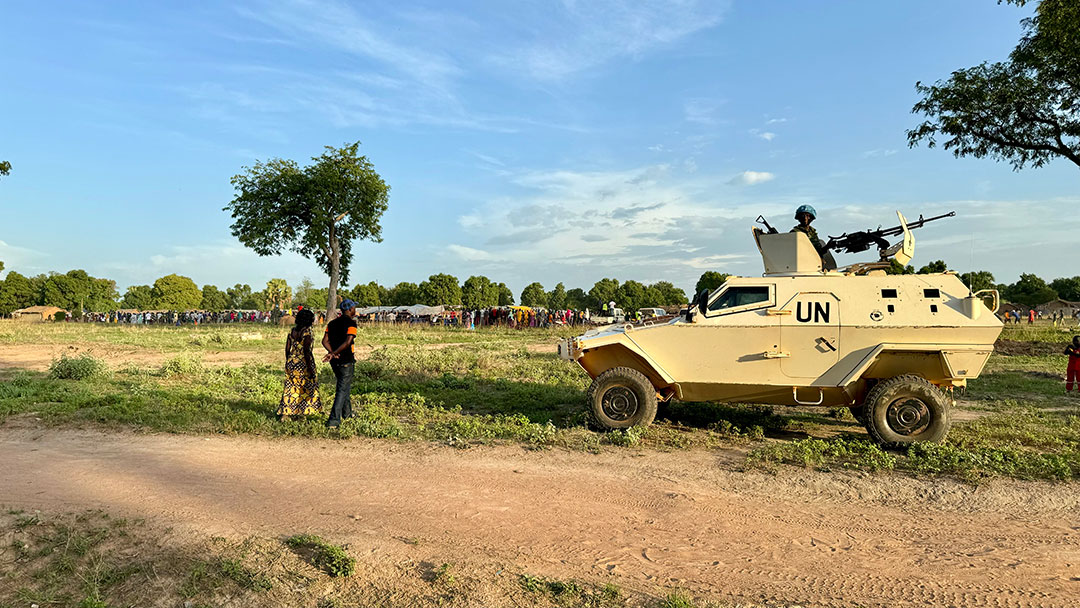ADF STAFF
As United Nations peacekeeping missions in Africa face criticism, protests and, in some cases, are being forced to withdraw, the mission in the Central African Republic has bucked the trend.
In November, the U.N. Security Council renewed MINUSCA’s mandate for another year, news that was met with approval by the host country’s government and civil society groups, according to published reports.
“MINUSCA is a strategic partner of the Central African government,” Maxime Balalou, spokesman for the CAR government, told Radio Ndeke Luka. “MINUSCA has done a lot for the government, even if we’ve had some challenges. … With MINUSCA we’ve had stability, it’s important to recognize that.”
Similarly, on the streets of Berberati, in the country’s west, passersby told a radio station they were happy the mission was staying. “When you talk about the mandate it’s about the results, and the results of MINUSCA have been better for the Central African Republic and its people,” a pedestrian told Radio Guira, which is funded by the U.N.
“If we have security now, it’s due in large part to MINUSCA,” another interviewee told Radio Guira.
Statistics show that the security situation is a work in progress. After years of violence, a peace agreement was signed in 2019 and a ceasefire in 2021. In recent months the main rebel group, known as the Coalition of Patriots for Change (CPC), fractured and hundreds of members laid down arms.
But life has not returned to normal. Fighting continues, particularly in the Haut-Mbomou region in the country’s east. CAR also is rocked by spillover violence from neighboring Sudan. Russia’s Wagner Group mercenaries continue to operate in the country, where they control mining areas and attack civilians with impunity.
“The cross-border flow of foreign fighters, arms and natural resources contributes to a thriving conflict-economy,” the Global Centre for the Responsibility to Protect wrote in a December 1 situation report. “Wagner operatives have committed human rights abuses and targeted civilians as they maintain and increase their control of mining areas.”
Overall, 465,000 people are internally displaced in the CAR, and 664,000 are refugees in other countries. Between June and October 2024, the country recorded a troubling 73% increase in human rights violations and abuses, including “grave violations” against children and conflict-related sexual violence, the U.N. reported.
“The security situation remains precarious in certain areas,” the Global Centre wrote. “The targeting of ethnic and religious communities heightens atrocity risks and may trigger further violence along communal, religious and ethnic lines.”
Over the next year, a primary responsibility of MINUSCA will be preparing the country for local elections in April and presidential elections in December. The mission also will oversee a demobilization, disarmament and reintegration process for armed groups.
Above all, MINUSCA leaders believe success will be measured by how the mission protects civilians. When Valentine Rugwabiza, special representative of the U.N. secretary-general in the Central African Republic, took her position in 2022 she called for a “readjustment” of the mission’s strategy to be more responsive to threats faced by civilians. She wanted MINUSCA to have a “robust, preventive and proactive posture in response to alerts received from communities.”
In her October 23 statement to the Security Council, Rugwabiza said the mission is making progress in some of the CAR’s most remote regions near the border with South Sudan, and the presence of blue helmets and CAR authorities is allowing refugees to return. U.N. engineers have constructed or rehabilitated more than 2,000 kilometers of roads, 131 bridges and 37 airstrips in the past two years.
Perhaps most important has been the U.N. support for reopening the Bambouti-Obo-Bangassou road, a vital economic corridor that bisects the country.
“Despite notable efforts and significant achievements since the start of the mission, the risk of reversal remains,” Rugwabiza said. “The tangible and transformational progress achieved in close collaboration with the Central African government now requires expansion and consolidation, and the role of MINUSCA remains critical.”
The post MINUSCA Prepares for ‘Critical’ Year as Mandate Is Extended appeared first on Africa Defense Forum.


